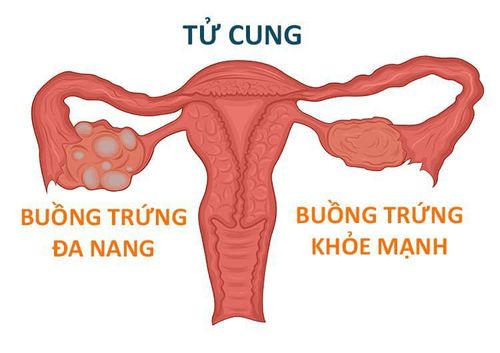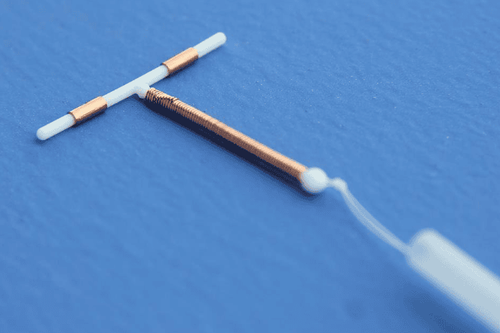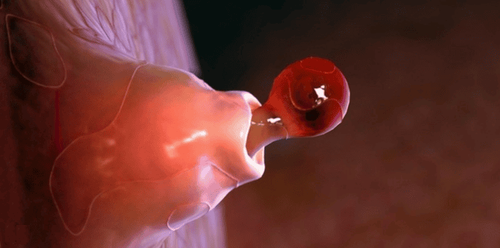This is an automatically translated article.
The article was professionally consulted by Specialist Doctor II Huynh Thi Hien - Department of Obstetrics and Gynecology - Vinmec Nha Trang International General Hospital.Polycystic ovary syndrome (PCOS) is an endocrine disorder in women. The common characteristic of patients with PCOS is that there is an excess of androgen hormone (a hormone abundant in men) leading to symptoms such as hirsutism, acne, menstrual irregularities, and ovarian cysts. . Despite the effects on fertility and possibly infertility, women with PCOS still need contraception if they really don't want to have a baby. So what is a good contraceptive for these patients?
1. Birth control pills for women with polycystic ovaries
Oral contraceptives are the most common and effective option used to control symptoms of polycystic ovary syndrome. There are two types of birth control pills: the combined pill and the progestin-only pill. Both are effective for treating PCOS symptoms and helping women:Ovulation; Have regular periods; Have lighter periods; Abdominal pain relief; Have brighter skin; Reduced risk of endometrial cancer, ovarian cancer and ovarian cysts; Reduces hair and hair growth. Most women with PCOS do not experience side effects when taking the pill, however, different birth control pills affect each person differently, some of the side effects that can be experienced while taking the pill include:
Mood swings; May gain or lose weight; Nausea; Headache ; Chest pain; Vaginal bleeding. 1.1 Combined oral contraceptives Combination pills contain estrogen and progestin, two synthetic hormones that are similar to those made by the ovaries. The amount of hormone present varies between brands. You can choose low-dose or high-dose formulations. For example, low-dose combination pills contain about 20 micrograms (mcg) of estrogen. High-dose birth control pills usually have between 30 and 35 mcg of estrogen. Your doctor will help determine the right dose for you.

2. Contraceptive skin patch
The birth control patch is a thin plastic patch that contains estrogen and progestin. You need to wear the patch for 21 days, take it off for 7 days to get your period, and then replace it with a new one. Like the pill, the patch can help:Ovulation; Regulate your menstrual cycle; Reduce flatulence and cramps; Reduce acne; Reduce excess hair growth; Reduce your cancer risk. Common side effects of the patch include:
Sensitive skin; Nausea and vomiting; Mood swings; Chest pain; Headache; Possible weight gain; High Blood Pressure.
3. Vaginal ring
The NuvaRing is a soft, flexible plastic ring that is inserted into the vagina. Like the pill and patch, the vaginal ring can help you:Ovulation; Menstrual conditioning; Reduce flatulence and cramps; Reduce acne; Reduce excess body hair; Reduce your cancer risk. Common side effects of the ring include:
Headache; Dizzy ; Nausea; Chest pain ; Tired; Possible weight gain; Change your appetite.

4. Which hormonal contraceptive will work?
For women with PCOS, combined contraception – whether in pill, ring or patch form – is the most common and recommended form of PCOS treatment. However, if you can't take the combination pill or use other combination methods, your doctor may suggest a progestin-only pill. There are also other alternatives, including:Progesterone therapy: Progesterone can be taken for 10 to 14 days every 1 to 2 months. This treatment does not prevent pregnancy or improve androgen levels, but it can help control symptoms of the disease. Progestin-containing IUDs (IUDs): IUDs that contain progestin may help ease symptoms of PCOS in the same way as a combination or progestin-only pill.
5. Use birth control to protect from pregnancy
Although PCOS is the leading cause of infertility, it affects every woman differently. Some women may become infertile at a young age, and others may find that it is still possible to get pregnant. Talk to your doctor about your condition and what options are available to you, whether it's a conception plan or assisted birth control. If you decide to use birth control to manage PCOS and want to reap the benefits of contraception, there are a few things you should know.5.1. About birth control pills On average, birth control pills are about 91 percent effective. This means that about 9 out of 100 women using this medicine will become pregnant each year. If you miss a dose, your risk of pregnancy is increased. Set reminders on your phone to help you remember to take your medicine at the same time every day.
5.2. About the patch and vaginal ring The patch and vaginal ring are also about 91% effective. This means that about 9 out of 100 women using either method will become pregnant each year. It's important to change your vaginal ring or skin patch on time so that you have ongoing protection. Your chances of getting pregnant increase every day if you don't use birth control.

6. Choose the best birth control method for you
If you have PCOS, talk to your doctor about which treatment option is best for you. As you and your doctor go through your options, be sure to consider:Ease of use: You should think about which birth control pill will be easier for you to use. If it's hard for you to take your pill every day, a ring or patch may be a better option for you. Side effects: Most hormonal birth control options have similar side effects. However, your doctor may refer you to someone else if you have concerns. It may take several different options before you find the one that works best for your body and lifestyle. Cost: If you can, check with your insurance company to find out if any birth control methods are covered and what your out-of-pocket costs may be. If you don't have insurance, talk to your doctor about patient assistance programs. =>> Advice from a specialist: For people with polycystic ovary syndrome, they should use combined oral contraceptives to increase contraceptive effectiveness and regular menstrual cycles.
Vinmec is a prestigious medical system with full medical equipment and doctors with experience in the field of obstetrics and gynecology.
If you have a need for consultation and examination at Vinmec Hospitals under the nationwide health system, please book an appointment on the website for service.
Please dial HOTLINE for more information or register for an appointment HERE. Download MyVinmec app to make appointments faster and to manage your bookings easily.
Reference source: healthline.com













